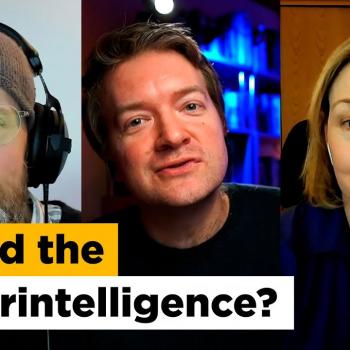
The former Hawk Nelson singer is gracious and vulnerable in talking about how his faith fell apart on Unbelievable?. He’s among a number of recent high-profile deconstruction stories. But are these collapses due to the power of the forces that toppled their worldview? Or the poor construction that went into building them?
“After growing up in a Christian home, being a pastor’s kid, playing and singing in a Christian band, and having the word “Christian” in in front of most of the things in my life – I am now finding that I no longer believe in God….I’ve been terrified to post this for a while – but it feels like it’s time for me to be honest. I hope this is not the end of the conversation, but the beginning. I hope this is encouraging to people who might feel the same but are as afraid to speak as I am. I want to be open. I want to be transparent with you all – and also open to having my heart changed in the future. I am not looking for a debate at all – just a chance to share my story in the hopes some good can come from it. I love you all.” (Jon Steingard Instagram post May 20, 2020)
The church has experienced the loss of increasing numbers of young people from its ranks over the years. We have tried sweep it under the rug but now look on in horror as social media airs our dirty laundry by exploiting high-profile defections. It hurts, it doesn’t seem fair. Nobody in the press wants to promote stories of prominent atheists becoming Christians. We may be surprised – but Jesus isn’t. He told us that we would be hated because of His name, so instead of moaning about the unfairness, we need to listen to what the deconverted have to say because their stories serve as both a warning and an opportunity. If we care about the health of the church then we need to carefully listen to their stories because they not only reveal our present evangelical poverty but also provide a rich opportunity to formulate an apologetic correction.
Unbelievable? has featured some very interesting episodes exploring deconstruction, but one of the most fascinating featured a discussion between apologist Sean McDowell and former Christian music star Jon Steingard. Both men were raised in the church, Jon’s father is a pastor while Sean is the son of the famous apologist Josh McDowell. Despite their Christian upbringings they both faced doubts about their faith. Doubt caused Sean to become a prominent apologist in his own right, while Jon’s caused him to lose his faith. Why the different responses? What can we learn from the journeys of these two men?
This is Serious
Jon has been a most gracious deconvert. He has been completely transparent about his personal struggles as well as candid about his concerns over Christianity. He has become the welcome public face of doubt for many young people who secretly struggle with their faith. We need to take high-profile deconversions like Jon’s seriously because they often do it at great personal cost. Prior to their public declarations, their livelihoods depended on the Christian machine. Renouncing their faith meant a career change, a loss of friends, a loss of fame, and a loss of income. The level of their personal sacrifice brings gravitas to their statements and raises a very important question; why would a Christian deeply immersed in Christian culture with every Christian resource at his or her disposal lose their faith? What does that say about the current state of Christianity if it is incapable of saving one of its own?
Burning Down the House
Data from the Pew Research Center reveals that there has been a gradual hemorrhage of young people from the church. The Barna Group studied the reasons for this exodus and found that they primarily revolve around the inability or unwillingness of the church to respond to doubt. We all experience dry seasons that need spiritual watering but if the church isn’t prepared to mobilize a fire fighting brigade then every burning question becomes a flash point that can potentially torch a faith. Since doubt is universal, I would argue that the problem isn’t the drought but the stinginess of the church in dispensing Living Water.
Opiate of the Masses
One of the most powerful components of the religious life of many of these high-profile Christians was the church youth group. Jon shared that he was raised in very charismatic environment that focused on experiences of the Holy Spirit. He was heavily involved in a community of young people who were bound together by an us-versus-them mentality where the secular world was the evil outsider and they were the enlightened insider. The experience of close relationships and intoxicating praise music often creates a tribal unity that makes youth group look more like a crack house dispensing the opiate of the masses than a safe place to test the spirits to see whether they are from God (1 John 4:1).
I don’t want to suggest that it’s impossible to have a true experience of God in youth group but based on the data and the testimonies of many Unbelievable? guests these experiences seem incapable of sustaining a robust faith. The problem is that once our young people sober up and leave home for college and career they find that the outsiders aren’t such bad people after all. In fact, many of them will become close friends who just happen to have sincere questions about Christianity. Jon’s observation is very prescient because stories of conversions occurring under the influence of good music, good friends, and a bonfire at youth camp are very common. The problem is that emotional surrender in the heat of the moment doesn’t keep one warm enough to withstand the cold front ushered in by the winds of modernism and postmodernism.
The church needs to be more proactive about weaning its young people off youth group milk and teaching them how to handle an apologetic knife and fork so they can dig into the meat of the Gospel.
About this we have much to say, and it is hard to explain, since you have become dull of hearing. For though by this time you ought to be teachers, you need someone to teach you again the basic principles of the oracles of God. You need milk, not solid food, for everyone who lives on milk is unskilled in the word of righteousness, since he is a child. But solid food is for the mature, for those who have their powers of discernment trained by constant practice to distinguish good from evil. (Hebrews 5:11-14)
Rock Gods
Christians in the music industry often have their youth group experience extended into adulthood because they tend to become the high priests of worship for the next generation. Jon shared that when he performed he often felt the presence of what he perceived to be the Holy Spirit but this illusion was shattered when he attended a Coldplay concert and experienced the very same “presence.” He worried that his faith was actually just an emotional ghost conjured up by a musical séance and he feared that he was becoming the medium fostering that illusion in his fans.
Jon initially had a supportive role in Hawk Nelson but as time went on he began to assume the role of lead singer and song writer. He began to ponder the significance of this new role as a voice for the Christian community while simultaneously experiencing a decline in his faith.
“I started out as a guitar player, so I was just sort of in a more supportive role. And I became the singer in 2012. And that kind of catapulted me into this position where I had a microphone, and I was writing songs, and I was sort of like casting the vision for the band. And a funny thing happens when you become the singer of a Christian band, all of a sudden, you’re put in this role that has almost a pastoral element. And there’s an expectation that you’re going to have something worthwhile to say and so I feel Like that was a season of me digging in a little more and going, Oh, I really need to be able to say things that are meaningful and to write songs that are meaningful to people… and then over time I just started to have more and more questions about the reality of who God is and the Christian faith and the traditions I had been raised in. I think while I was doing Hawk Nelson anytime I had a doubt or a question, I was so terrified of it, because it threatened my livelihood and my social relationships and my family relationships. I was so scared of finding myself in this position where I’d have to get up on stage and sing something that I didn’t believe that I think I just stuffed those questions and doubts down for a long time and didn’t let myself think about it.”
Fortress of Solitude
Emotion cannot sustain a robust faith so one also needs an intellectual fortress of solitude where one can retreat to recharge one’s Christian superpowers. A place to reflect on the practical and intellectual value of being a follower of Jesus. A dwelling stocked with holy books from every worldview, and a hot-line to a church that values apologetics as much as evangelism. We all have a Christian superpower that sustains us even when we are confronted with skeptical kryptonite. I believe one of the goals of apologetics is to help people identify their superpower and maximize its use. The power source of first importance for Sean is 1 Corinthians 15:3-4: that Christ died for our sins in accordance with the Scriptures, that he was buried, that he was raised on the third day in accordance with the Scriptures. Jon, however, wasn’t convinced enough about the historicity behind a physical resurrection to make it a foundation upon which he could build his faith.

Image attribution: Premier Christian Radio
Personally, whenever I doubt, I return to a more basic set of propositions. The universe looks like it was designed by a mind (God Spoke). Humans are uniquely physical and spiritual (Image bearers). The world has a problem and the problem is found only in humans (The Fall). The problem is spiritual and seems to be the insatiable desire of humans to act like God (Satan’s temptation). All religions try to solve this problem but the only one that makes sense is Christianity (The perfect physical/spiritual Man healing our physical/spiritual conflict). I prefer a more experiential grounding to my faith because I believe, as St. Paul said in the first chapter of Romans, that we have no excuse for not seeing God in the things that He has made. Jon continues to spend quality time in his fortress reading everything he can get his hands, asking theological questions, and engaging with believers and non-believers in public forums but has yet to find his Christian superpower.
Guard Your Heart with Your Mind
Sean offered memorable advice which he received from his father regarding the danger of an emotionally generated faith without intellectual grounding, “Guard your heart with your mind, not your mind with your heart.” Jesus is the best news ever so our faith should be one filled with dancing and singing but we also need to set aside time to fuel our enthusiasm with a feast of intellectual delicacies. Faith should be built upon both reason and emotion because they complement one another, yet are insufficient unto themselves. Emotion should be the celebration of intellectual integrity and reason should be the sober approval of appropriately conducted emotion.
Us versus Them
Jon is appropriately disturbed by the “us versus them” mentality that often accompanies the evangelical culture. While on the road he had the opportunity to attend a variety of church services and what he noted was that the many denominational differences seemed to go beyond mere worship preferences and became claims to doctrinal superiority. He realized that the “us” wasn’t as unified as it claimed to be. The church appears hypocritical to the rest of the world when it says that Jesus is the only way while it simultaneously argues with itself over His real presence, dunking or sprinkling, slain or motivated, and speaking in tongues or expositing God’s word. Our claim of salvation in Jesus alone often appears to depend on whether He is wearing a robe, cassock, or blue jeans. Sadly, the variability in Christian practice that we put on display just serves to confirm the postmodern mantra that all truth is relative. We need to do a better job of investing in the deposit of faith rather than flaunting our denominational expenditures.
Circling the Wagons
Sean pointed out that we need to set aside the religious trappings and get to the heart of what Jesus said and did. Sean is right because all too often we circle our denominational covered wagons around Jesus thinking that we are protecting the Lamb of God when in reality we are keeping the Lion of Judah captive. We have greeters inviting seekers on board promising them a glimpse of the Jesus within but then make sure they view Him from a distance with dogmatic binoculars. We warn them that stepping off the bandwagon with nothing but a broken and contrite heart is just too messy and may leave emotional stains on the new sanctuary carpet. Thirsty they want to run to the fountain of living water, but instead we hand them bottles of doctrinally filtered Perrier. We need to help seekers encounter the real Jesus and not distract them with His advance men – Calvin, Luther, and Wesley.
Liar, Lunatic or Lord
Jon recognized that Jesus was special but wasn’t convinced that He was God incarnate. He held out the possibility that a human could do and say the things Jesus said and did. Sean, however, pointed out that if a human were to construct a religion it wouldn’t look at all like the one Jesus embodied.
“So if you’re going to make up a religion, I mean, think about the things that Jesus taught. He said, if you want to be first, be last, he said, pick up your cross, and follow me. He says, no, it’s not just committing adultery, it’s the thought in your hearts. Hey, true love is this lay down your life for a friend. Pray for your enemies. I mean, the teachings of Jesus are so radical and against religion being used to oppress and marginalize people, that anybody who does so utterly misses what the Christian message is about…if (a human) was making up a religion, it would look a lot like a, b and c, because it has written into it certain power structures to oppress and control people. And I look at Christianity I see the life that Jesus lived, the ethic he taught in the Sermon on the Mount. I can’t convince myself that people made this up as some tool of oppression and control over others. It’s the opposite. Give up your life, lay it down, love people pray for your enemies.”
Sean believed that Jesus’ stunningly counter-cultural message of power found in weakness, first being last, picking up your cross, praying for enemies, and dying for others, seems unlikely to have been devised by man. He pointed out that Jesus has been eagerly adopted into the pantheon of many other religious groups because His ideas are just so darn God-like. Jon, however, couldn’t rule out the possibility that these ideas could have come from a mere mortal. Yet, despite thousands of years of cultural progress, the only one who brought them forward was an allegedly incarnate God. We don’t get to pick and choose what we like about Jesus and form a religion that appeals to us because He didn’t give us that option.
A man who was merely a man and said the sort of things Jesus said would not be a great moral teacher. He would either be a lunatic—on the level with the man who says he is a poached egg—or else he would be the devil of hell. You must make your choice. Either this man was, and is, the Son of God; or else a madman or something worse … You can shut Him up for a fool, you can spit at him and kill him as a demon; or you can fall at his feet and call Him Lord and God. But let us not come with any patronizing nonsense about His being a great human teacher. He has not left that open to us. He did not intend to. (C.S. Lewis)
Crocodile Tears or a Jesus Who Weeps
One of the most powerful reasons for Jon’s deconversion was his encounter with the pain and suffering he encountered on a trip to Uganda. He touchingly related the sorrow he felt as he saw young children, the same age as his own, abandoned, starving, and dying. He couldn’t understand how a good God could allow that to happen. Intellectual arguments paled in comparison to the reality of the suffering he witnessed.
“I had always believed that God was so personal that he would answer even our silly prayers, even our prayers for a parking spot at church. I really had believed that and here I’m confronted with horrible suffering. I mean, 50% of these children don’t make it to the age of five. These are, you know, kids the same age as my son and now my daughter and to see them suffering like that, and dealing with things that I couldn’t imagine. I had a really hard time reconciling the idea, the image that I’d had in my mind of God the Father, you know, the loving God, what father could see this and do nothing… I know that there’s intellectual answers to that question because I’ve read them. But in that moment and still when I take myself back to that place, those answers feel deeply dissatisfying. And that was a linchpin, I felt like a very big part of my belief was yanked out from under me through that experience”
While I agree with Jon that academic explanations more often feel like salt in the wound of those who suffer, I would argue that eliminating a morally reprehensible God doesn’t make the pain and suffering go away. In fact, removing God from the picture just replaces Him with natural selection which gets a free pass every time it callously ignores the oppressed, hungry, and meek. Jon was deeply affected by the amount of evil and pain he encountered but if he rejects God then he has no choice but to embrace the screams as the contented sounds of a well-oiled natural selection machine. Jon weeps, but unfortunately there is no crying in evolution. The choice is quite stark, an incarnate God who gives rest to the heavy laden or a natural selection that offers nothing but blind pitiless indifference. A Jesus who weeps at a tomb or an evolutionary process that sheds crocodile tears. I think that many an atheist subconsciously wants God to exist so that they can vent their anger on an imaginary deity every time evolution gets a little too rough with the unfit. It is a form of divine primal scream therapy that temporarily assuages their nihilistic anxiety.
The only religion that takes suffering seriously is Christianity. Buddhism seeks to avoid it, Hinduism sees it as pay back for bad karma, New Age sees it as the result of negative thinking, and Atheism sees it as the way the cookie crumbles. Christianity, however, takes it on and transforms into something good. It is one thing to disbelieve in a God who allows suffering but quite another to reject One who takes it upon Himself and redeems it. Jon appropriately recognizes the inadequacy of theological explanations for suffering but fails to acknowledge that Christianity is the only one that believes it can be redeemed. Suffering calls for redemption and not rationalization, so the real question isn’t which religion or worldview explains suffering but rather which one redeems it?
Prosperity Light
One of the problems with evangelicalism is that it has been infiltrated by a soft prosperity gospel that promises a carefree happy life. Jon even admitted that he had worshipped a God who gave him good parking spots. God, however, isn’t a parking attendant that you can bribe with a prayer. If God truly was a vending machine who gave us what we wanted then we would be justified in kicking Him if he didn’t dispense the goodies. However, if instead He is One who hangs alongside us and feels our pain then how can we reject His embrace? The beauty of Christianity is that it worships a God who refuses to pave over a paradise acquired through suffering just to make room for a great parking lot. Christianity isn’t a broken street of dreams that leads to an emotional dead end but a via dolorosa that ends up in a Kingdom where Jon’s tears will be wiped away, not by an intellectual handkerchief, but by the hem of the robe of the only One with the street Cred to do so.
Faulty Construction
One of the things that I have been most struck by in the Unbelievable? episodes that have chronicled the deconstruction of high-profile Christians is not the power of the forces that toppled their worldview homes but the poor construction that went into building them.
We all have a worldview home. A safe space where we go to be protected from the thorns and thistles. A domicile built with sweat and tears. But the problem is that many of us are so distracted by the emotional feng shui of our home-sweet-home, that we fail to establish its intellectual structural integrity. We overestimate our own construction skills and were deceived by the pretentious sales pitches of the various unbonded and unlicensed postmodern subcontractors we hired to complete the job. Sadly, our lack of architectural awareness results in an unstable worldview where the roof leaks, the heat periodically goes out, and a fuse blows every time we plug in a new cultural appliance.
If we Christians want to be relevant to those who desperately need Jesus in their lives, we can’t just ridicule the rickety worldview they have cobbled together because when we do we deny the deep emotional investment they have already put into such a massive undertaking. We can’t just callously condemn it, string caution tape around it, and leave them homeless. We need to be willing to walk through their home and listen to their stories of how it was built. We need to compliment them on each well-placed two-by-four of God’s truth but also warn them that their foundation appears shaky.
Tuned Up or Totaled
Jon admirably took his doubt seriously and noted that the foundation of his Christian home was beginning to crack so he started reading some of the best apologetics books available in order to fill in the fissures. He gradually discovered that what he needed wasn’t a patch job but an entirely new foundation. I asked Jon on his Facebook broadcast with Sean why the work of these famous apologists failed to convince him? His answer was powerful. He said that when he read these books he had to put them down after a couple of pages because he found that they took as foundational things he didn’t feel were foundational, they assumed certain concepts as self-evident that he felt had not been properly vetted. He felt that apologetics was useful for someone who just needed a spiritual tune up but was useless to someone whose faith had been totaled.
Autopsy of Faith
The ongoing conversation between Sean and Jon is an example of how defending the faith can be done with gentleness and respect. We can be sad about Jon’s deconversion but we must also be grateful that he has allowed us to come alongside him on his journey. Jon has graciously allowed us to perform an autopsy on his faith in order to better understand the causes of religious death. We owe him a debt of gratitude for spilling his guts but remain hopeful because we know that deep down he already knows Someone who came back from the dead.
Listen or watch Jon Steingard and Sean McDowell in conversation on Unbelievable?












